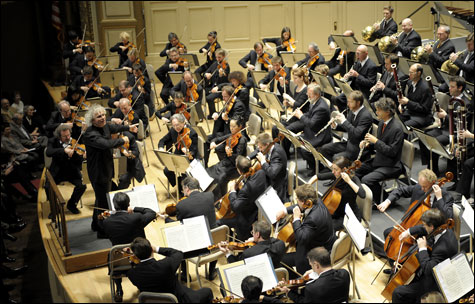
PHENOMENAL DEPTHS OF SOUND: Rattle and the Berlin Philharmonic played Brahms and Schoenberg with layer upon layer of extraordinary richness. |
Everyone present at the return of Simon Rattle and the Berlin Philharmonic this past Sunday must feel an enormous debt of gratitude to the Celebrity Series of Boston. And though the program didn't sound especially promising — two Brahms symphonies (Nos. 3 and 4 — don't we get enough of them?) and a short, unfamiliar Schoenberg piece (Accompaniment to a Cinematographic Scene) — it was a thrilling event. The orchestra played with phenomenal depths of sound, layer upon layer of extraordinary richness. Rattle's approach to Brahms was profoundly illuminating. And since Schoenberg loved Brahms (his elaborate orchestration of Brahms's G-minor Piano Quintet, which Rattle led in New York, has often been called Brahms's Fifth Symphony), placing between the Brahms symphonies this beautiful and tension-filled six-minute score for an imaginary silent film (from 1930, at the height of German film Expressionism) was both palate-cleansing and a vivid reminder of how 20th-century music evolved from Brahms. James Levine and the BSO paired Schoenberg with Beethoven a couple of years ago, and this year Emmanuel Music is coupling Schoenberg and Haydn. Brahms provided another context for our understanding of Schoenberg — and Schoenberg for our understanding of Brahms.
Here's why I was so impressed with Rattle. Too much Brahms seems stodgy and "classical" — the lesser heir to Beethoven, without Beethoven's ferocious energy. Or else too soupily Romantic, vehicles for juicy tunes. Rattle played these contrasting symphonies as drama, works dealing with nostalgia, the pull of memory (perhaps illusory, invented memory), haunted or even trapped by the past. But also with the desire, sometimes a desperate need, to go forward, to face a possibly terrifying and potentially tragic future with heroism. In every phrase, I could feel Rattle coming to grips with this mixture of restraint (the holding back) and urgency (the push forward), resistance and determination — all making remarkable sense of Brahms's ambiguous key signatures, whether in the gentler Third in F major or the more driven E-minor Fourth. The mysterious dance-like slow movement of the Third, maybe my favorite Brahms movement, brought me to the edge of tears.
Despite Beethoven's name above the Symphony Hall proscenium, and the weeks the BSO has just devoted to Beethoven, we shouldn't overlook the orchestra's historic commitment to French music. Last week, Fabio Luisi, a young Italian conductor working mostly in Germany, led a program of more or less French music: French-born Swiss composer Arthur Honegger's very Debussyan Pastorale d'été (1920), Saint-Saëns's Piano Concerto No. 2 (1868), and Stravinsky's Petrouchka, which premiered in Paris in 1911 at the Ballets Russes, with Nijinsky in the title role of the benighted tragic-comic puppet.
I was especially taken with the languorous, woodwindy Honegger, in its first BSO performance at Symphony Hall since 1929, when Honegger himself conducted it. In the BSO's most recent (1998) performance of the Saint-Saëns, which alternates an almost Wagnerian heft with charming tunes and scintillating ivory tickling, the great Slovenian virtuosa Dubravka Tomsic set a standard any pianist would have a hard time meeting. Lise de la Salle, a 21-year-old from France, is technically fluent, and she knows the difference between heft and charm. I wish she also had greater dynamic and tonal variety. Everything sounded a little loud, a little lacking in color — even when she was aware of contrasting elements.